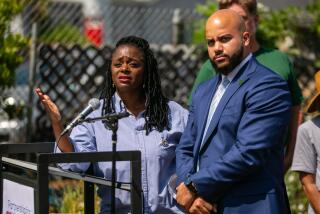PREVIEW / MASSACHUSETTS TAX ROLLBACK? : Angry Voters May Cut Levies to ’88 Level : Opponents say measure would cost state billions. Devastation of aid for the needy seen.
BOSTON — Paula Austin said she had a fitting punishment for Massachusetts politicians who have presided over the state’s recent fiscal turmoil.
“As far as I’m concerned, they can take every one out and guillotine them,” she said.
Austin’s comment is a familiar one these days in Massachusetts, where public anger at state government, fed by two years of fiscal chaos, is raging nearly out of control.
The anger mounted in recent months as lawmakers struggled without success to reach agreement on a plan to wipe out existing and projected budget deficits. It intensified in July, when lawmakers enacted the largest tax hike in the state’s history--including an extension of the sales tax to nearly 600 services--and then approved a budget many contend is out of balance.
One result of the turmoil has been to build momentum for a Nov. 6 ballot initiative that would repeal all state tax and fee hikes enacted since July, 1988. It would also lower the income tax for 24 months to reimburse taxpayers for a temporary increase adopted in 1988.
Many see the debate over Question 3, the petition sponsored by Citizens for Limited Taxation, as a rematch of the fight in 1980 over the citizen group’s ballot plan to limit local property taxes, which won voter approval.
The battle lines this year closely resemble 1980, with a patchwork coalition of labor unions, municipal officials and human service advocates lining up against the petition, and Citizens for Limited Taxation, the Massachusetts High Technology Council and a few business groups in support.
As in 1980, both sides are portraying the stakes as high. Gov. Michael S. Dukakis has warned that passage of the rollback would be devastating to state and local services.
“It’s one of those things that is so inconceivable in its destructiveness that you have to believe (that) by November people will have come to their senses,” former U.S. Sen. Paul E. Tsongas said.
State officials say that passage of the initiative will mean the loss of $1.14 billion in tax revenues for the fiscal year ending July, 1991, and $2.1 billion the next year. About $220 million or so in fees charged by various state agencies also would be lost this year.
James Braude, director of the Campaign for Massachusetts’ Future, the coalition opposing the petition, said that, if it passes, it will result in a 31% cut in non-mandatory spending in the first six months of 1991.
“That’s unconscionable,” he said, predicting devastation to programs that serve needy people.
Braude said the petition would also wreak havoc on an economy already in recession by halting major job-producing construction projects and further reducing the state’s bond rating, already the lowest in the nation.
But supporters say the ballot question is the public’s last chance to put an end to the state’s runaway spending habits and the recurrent tax hikes needed to support them.
“I think what we’re doing is sidestepping the state Legislature and governor to correct a problem they won’t address,” said Francis J. Faulkner, associate director of Citizens for Limited Taxation.
Howard P. Foley, president of the high tech council, said that, even after the spending cuts required by the petition, state spending will have risen by 85% over seven years. “I think most people would say that should be sufficient,” he said.
Although not strictly a partisan issue, the rollback debate could dominate this year’s gubernatorial race, especially if Boston University President John R. Silber wins the Democratic nomination. Although he is the most conservative of the three Democrats in the race, Silber has been most outspoken in denouncing the citizen group’s plan. The two Republican candidates support it.
Analysts say the task facing petition opponents is daunting, although not insurmountable.
Paul Watanabe, chairman of the political science department of the University of Massachusetts at Boston, said opponents must articulate to the public “the real costs” of the petition.
But voters like Tom Quincy say they have already decided to vote yes.
“Maybe then they’ll spend the money in the right way,” he said of state officials.
More to Read
Sign up for Essential California
The most important California stories and recommendations in your inbox every morning.
You may occasionally receive promotional content from the Los Angeles Times.










